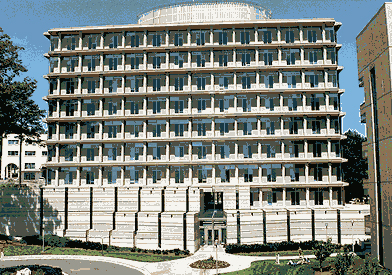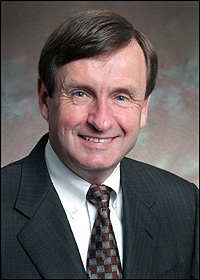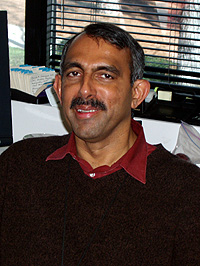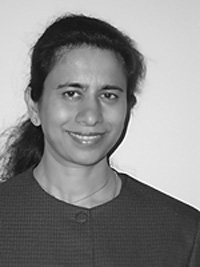|
|
| Emory, India & Public
Health
BY VEENA RAO
|

|
|
Emory University, which is known for its academic excellence, highly ranked professional schools, and state-of-the-art research facilities; has a growing new interest- India. Even as the country of a billion people struggles to meet its severe challenges in healthcare, sanitation and disease control, it has found a new advocate in Emory’s Rollins School of Public Health and its various departments.
The university’s India health initiatives have gained momentum after the formation of the Public Health Foundation of India (PHFI), a joint collaboration between the government of India, the Bill & Melinda Gates Foundation and other public and private partners. Headed by Dr. K. Srinath Reddy, head of the Department of Cardiology at the All India Institute of Medical Sciences (AIIMS), the foundation has on board Dr James Curran, the Dean of Emory’s Rollin School of Public Health and a pioneer in HIV and AIDS research in the country. |
 |
 |
|
Dr. James Curran |
Dr. K.M. Venkat Narayan |
|
“The purpose of the PHFI is to provide public health training and expertise as a way to more efficiently deal with the public health needs of a billion people. As part of this program, the PHFI plans to start five new schools of public health along the models of the IITs and IIMs. It also plans to train 10,000 professionals in public health, ” says Dr Curran. “The Association of Schools of Public Health of which I am chairman, agreed to partner with the PHFI to look at the curricula for these schools, to help train some of the faculty and to identify people who might be interested in short term or long term assignments in India.”
Part of the faculty could comprise people from the Indian diaspora who are interested in returning to India as faculty members, he says.
In the first year of its existence, the PHFI has deputed two of its prospective faculty members to be trained at the Rollins School of Public Health. Dr. Curran’s zeal is palpable. “India is one of the most important countries of the world,” he says. “That is evident now, and will be more evident as time goes on. We are in a good situation in relations between the US and India. There are huge opportunities to learn from each other, to work together and to address problems related to education and public health in India.”
Dr. K.M. Venkat Narayan, who recently joined Emory as
Hubert professor in the Hubert Department of Global Health at Rollins agrees. “I recently moved here from the Center for Disease Control (CDC) (where he played a big role in shaping CDs research efforts in Diabetes). One of the reasons I got recruited is because of Emory’s interest in India, and in chronic diseases and diabetes.”
“Emory sees global health as a very important priority. And within the context of global health, India is seen as a very important country because of its population and health challenges; and also because of the developing trade ties between the US and India. Also, a lot of Indian students come to Emory.”
Dr Narayan adds that Emory likes to work with several ethnic collaborators in India, on a mutually beneficial relationship.
“A lot of questions are better answered through mutual collaborations. There are several good institutions in India with brilliant scientists, like the AIIMs in Delhi, or the two diabetes centers in Chennai or the CMC, Vellore. Also, when you collaborate you think of more creative solutions.”
Several of these problems have no borders, he says. “If there is an influenza outbreak in India there is an outbreak here. Diabetes related problems are similar in both
countries." |

Dr Usha Ramakrishnan
|
Dr Usha Ramakrishnan, who is Associate Professor in the Hubert Department of Global Health has been at Emory since 1994. She sees a growing buildup of interest in India in recent years. Globalization coupled with information technology has brought India to the forefront. The increased mobility of professionals here has helped raise interest in India, she says.
“The immigrants of the 60s did not think of going back. But recent immigrants who have come with the idea of pursuing professional goals now move back and forth because of equal opportunities in India. There is increased mobility, which has led to an increased interest in giving back to society. A lot of professionals working in the US do not have to make a choice between here or there.” |
|
Emory is keen to have the support of the local Indian-American community for its initiatives in India.
“You are a 80,000 strong community and we are a school with many students and faculty members from India,” says Dr Curran. “The community needs to know about the kind of things we do, the opportunities we have and perhaps provide support to our faculty members and students.”
Dr Narayan has a broader vision. “When you look at the history of top universities like Cambridge or Harvard, you’ll see that they have grown because of certain communities backing them with endowments. For instance the Miami University has the committed support of the Hispanic-American community. If we want collective involvement and leadership in these areas, it is important for the community to get active. This provides an opportunity for a leadership role in defining what are the important areas that the University in Atlanta can focus on.”
“We are looking for involvement; the community’s inputs on what is important. We are interested in listening from academic and health perspectives. If we were to do studies, having the community to participate is as important as material support.”
“We have an institution here that is willing to engage. It is a give and take relationship,” he adds.
There’s a lot the community can do to support ongoing activities, agrees Dr Ramakrishnan.
There’s a lot going for India, says Dr Curran.
“An expanding economy and a strong history and tradition of education- two of the strongest predictors of public heath. If your economies are expanding more people will move out of poverty. There are opportunities to improve public health infrastructure.”
But he cautions about the challenges that India will face.
“Some times, societies struggle more when they become wealthy because of the growing disparities between the rich and the poor. This is evident is the US as well.”
Part of the struggle would be to provide the poor with improved access to public health. The challenge would be in planning a public health system that is rational and affordable,” he says.
And as part of its global health initiatives, Emory University is certainly committed to India’s cause. |
|
|
YOUR COMMENTS:
Emory and India India has some of the brightest minds in the world. The challenge for Emory is to work in partnership with the Indian Government and Indian
institutions to strengthen their capacity in identifying and solving their problems.
Stanley Foster
Tell us what you think of this feature.
Post
your comments.
Or
write to us at contact@nripulse.com.
|
|
|



